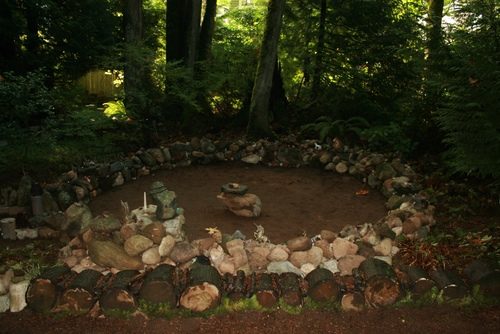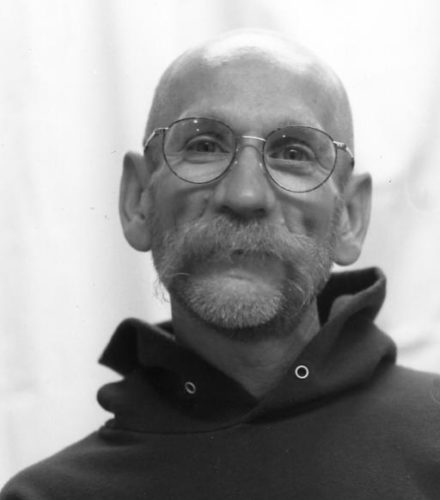KIRKLAND, Wash. –Not all Pagans have the opportunity to live closely attuned to the cycles of nature. Paul Beyerl and his partner Gerry were able to realize that dream 24 years ago when they purchased the land which became the Hermit’s Grove, a botanical garden of just over an acre in size that’s now surrounded by upscale homes in this small city adjacent to Seattle. The Rowan Tree Church, where Beyerl teaches the tradition called Lothloriën, is also rooted to this land.

Hermit’s Grove Stone Circle [From website]
“The Beatles told me to read books, meditate, and take acid; I did all of the above many times, and it changed my life quite radically.”
He found himself as part of the “back to the land” movement working on a northern Minnesota farm, which is when his serious studies began. Working at a bank to support himself, he learned about herbalism and Wicca. Three years later, he quit his job and became a full-time priest and author, articulating transdisciplinary truths such as how astrology impacts the growth of certain herbs.
“Modern physics, old religion; I was transcending worlds,” he said.
Living according to the times of planting and reaping, Beyerl has written multiple books informed by his attunement to nature. “Those things are supposed to be part of being Wiccan,” he said.
“I’m always a little amazed how many Pagans and Wiccans don’t really grasp these things as realities,” rather than intellectual concepts.
This idea, that the natural world is very much the primary reality for the longtime Wiccan priest, is evident in his newest book, On Death and Dying, which is subtitled, “There’s nothing wrong with being compost.” Death in his mind is just one more thing which fits into those cycles about which he has intimate knowledge.
The Hermit’s Grove “ties into my views of many things,” he explained; everything from herbalism to astrology to tarot “has to be relevant to your daily, practical life.”
He helps clients make that connection by choosing his words with care. In astrology, he focuses on the querent’s day-to-day business rather than the jargon of that discipline. Beyerl also ministers to prisoners, who are limited in the tools they can possess; to them he explains that magic is only as effective as one’s word, but those words can be powerful indeed if it is how the individual lives.
He considers his own life an example of that principle.
“I’ve had cancer twice, and both times it was diagnosed at just the right time. My spleen ruptured, but the best surgeon for the job just happened to be at the hospital, and free at that time.”

Paul Beyerl [Wikimedia Commons].
One maxim that stems from his belief about magic is a strict avoidance of negativity, which invariably ruins the spell. “Negativity is like a virus,” he said. “People love to be negative. It makes them feel important to have drama to talk about. Our unwritten rule is, ‘no drama, no politics.’ ”
To some extent, Beyerl may be inured to such influences by virtue of the life he’s led, fingers in the soil and nose filled with the smell of blossoms and loam. He’s noticed that some Wiccans that he meets don’t draw upon the energy of the Earth in the same way he does.
“People talk about being ‘drained’ after an initiation or intense ritual,” he observed, while he himself feels invigorated by that sort of work. “If you draw from the natural world, you should be full of energy.”
Beyerl is also skeptical of what he calls “Pagan poverty issues.” While he is poised to have a healthy bank balance once this land is sold, he is no stranger to a lack of funds.
“If you really believe what you say about magic, you wouldn’t be complaining about not having enough money. When I needed money, I just worked hard, scrubbing toilets or doing anything I could find.” He points to the disconnect from nature caused by the Industrial Revolution as the likely culprit.
To explain his views on money, he uses the six of pentacles from the tarot deck, which represents generosity. “Poor people are always more generous,” he said. “My parents were poor, but you only think of yourself like that if you want more than you can have.”
On the other hand, he looks to history and sees that two thousand years ago, “Pagan religions were corrupt, and all about money.”
He imagines that most Pagans today, if living in that time, “would have been underground Christians. It’s not about the denomination, its about who you are.”
While Beyerl is proud of the work that’s been accomplished in the grove, he and his partner have come to recognize that the land’s use will not outlive them, and they must take steps to ensure that the Lothloriën tradition does.
“We have to sell,” he explained. “It’s too expensive to maintain with the property taxes.” The neighborhood which has been built up around them is one of million-dollar homes on large lots; most of the space at the Hermit’s Grove, in contrast, is reserved for the gardens themselves. Their home is “tiny” with a porta-potty; a far cry from what the area has become.
“There’s nobody to take this over,” he said, because “it’s too much labor and expense,” and difficult to make a living working that land given the high costs in the area.

Hermits Grove [From website]
Minnesota is where the Lothloriën was formed, and the upper Mississippi valley is the “sacred heart of the cosmology” of that tradition. That’s in part because of the region’s “driftless” character, having not been touched by glaciation in the last Ice Age.
The decision to move is one Beyerl said has been in the back of his head for at least ten years, but he was reluctant because of the effort already expended working on and relating to the land. “We kept thinking we could make it sustainable,” he recalled.
The last time they received an unsolicited offer, he said, “we sat on it for two months,” and then he took a look at land prices back in Minnesota. “I was shocked” by the difference, he said.
“Over 25 years living on the West Coast, and I didn’t realize it’s pretty expensive here.”
Being less than three miles from the Microsoft campus certainly has put upward pressure on land prices, Beyerl admits, and on their attempts to live an agrarian life in an urban setting. “It’s been challenging, but quite wonderful,” he said.
“We live the cycles of the Earth,” with pollination determining the crop, organic pest control keeping it alive, and a grey system that’s used for hand-watering many of the plants.
In addition to the lower cost, Minnesotan land, as Beyerl believes, will make it easier to cultivate community as well. The Rowan Tree Church has 10-15 core members that worship together in Kirkland at a local Unitarian Universalist church, as there’s scant room for gathering at the grove itself. Adding to the space issues, “the entire suburban area is 75 feet wide and 25 to 30 miles long,” meaning that even those stalwarts must travel a fair distance to gather.
Around North America, the Lothloriën tradition boasts 40-50 families, and Beyerl is content with that.
“Some traditions hope to grow quickly,” he said. “Ours grows like a tree,” and where it lacks breadth it certainly has depth. More than a third of his students have been with him for 20 years or more, which comes as no surprise since completing the work in the tradition’s mystery school can itself easily take 18 years or more.
“I don’t know of any more difficult,” he said. “It’s more modeled on the Buddhist idea of lifetime study.”
Beyerl looks back at his lifetime unflinchingly, and is similarly unafraid of what’s to come. Having lived with HIV for close to three decades has helped shape his acceptance of his own inevitable end, an ethic which is reflected in On Death and Dying.
“People don’t live mindful of death anymore,” he said. “We used to be accepting of that, but now we want to pretend it’s not going to happen. It’s hard to get healthy again if you’ve got that fear. People are afraid of the fool card, of stepping off into the unknown.
“Making it to the eighties would be interesting,” he said. “Many people don’t pass through that milestone.” While he does not deny that his body is slowing down, “Being old is also really wonderful.”
Once he’s gone, Beyerl expects to be reincarnated and have to seek out his tradition all over again. The move to Minnesota will make it all the more likely to survive, he said, complete with funds and space for retired members of the clergy among the 4,000 rare books they have accumulated in the church’s library. Compost he will become, and from that compost he hopes to feed the tradition well enough that it’s there to welcome him back in his next life. Such is the circle of life, Lothloriën style.
* * *
The work of journalist Terence P. Ward was made possible by the generous underwriting donation from Hecate Demeter, writer, ecofeminist, witch and Priestess of the Great Mother Earth.
The Wild Hunt is not responsible for links to external content.
To join a conversation on this post:
Visit our The Wild Hunt subreddit! Point your favorite browser to https://www.reddit.com/r/The_Wild_Hunt_News/, then click “JOIN”. Make sure to click the bell, too, to be notified of new articles posted to our subreddit.
Pingback: Cultivating sources | True Pagan Warrior